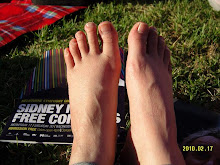Last night I was testing myself to embed my Delicious bookmarks into here. I was so happy when I finally managed to embed it, YAY!! I couldn't write a post about how to do it because it was really late in the night, 1am. So, here is the post.
I searched the google for 'delicious widget for blogspot', and it introduced me this site, "25 great blogger widgets" by Mashable (oo.. just realised that I have followed Mashable on twitter for quite sometime). In that post, it recommends the "Delicious Linkrolls". Linkrolls allow Delicous users to have their latest Delicious bookmarks displayed as part of their website. What I did is, I signed into my Delicious account, then adjust some settings in this Linkrolls, then insert the HTML code into the hypertext of my blogspot page.
Here comes the problem. I don't know where to find a section to put this HTML code in my blogspot. So, I read "Google Blogger for Dummies" (hehe!!) on "How to use HTML/JavaScrip gadget window in blogger". BINGO!!!
1. Go to customise page
2. Click on "add a gadget"
3. Find the gadget "HTML/JavaScript", click the + sign
4. Set my Title
5. Copy and paste the HTML code provided by Delicious Linkrolls to the content box of that gadget.
6. Click save button
7. Woohoo!! My delicious bookmarks was successfully embedded into my blog.
I love this adventure of trying, seeking, testing and the joy of found it and use it....
PLEASE UPDATE THE RSS FEED
1 week ago






